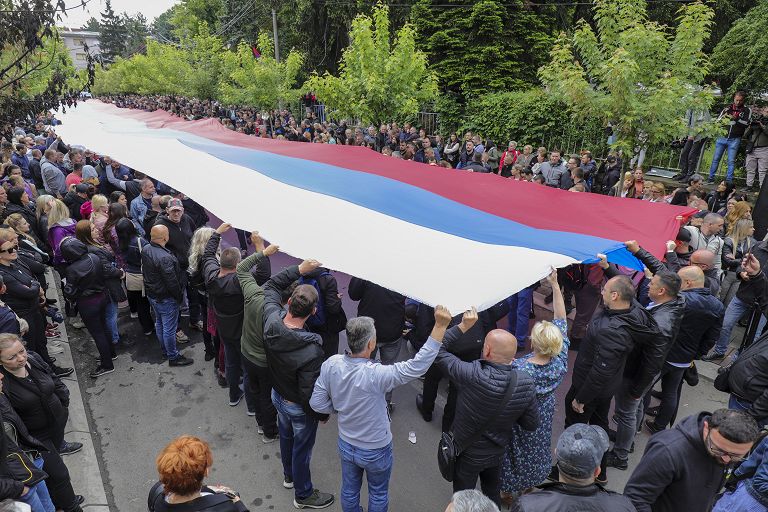Tension remains high in Kosovo, where clashes in the north risk turning into a dangerous fuse in one of the most flammable areas of Europe and the world.
Hundreds of ethnic Serbs gathered in front of the town hall of Zvecan, 45 kilometers north of the capital Pristina. The troops of the KFOR peacekeeping mission, led by NATO, cordoned off the area with metal fences and barbed wire barriers to avoid new clashes after those that, in recent days, caused the wounding of 30 international soldiers, including 14 Italian soldiers.
Ap
Serbian demonstration in front of Zvecan Town Hall
The reason for the clashes
The unrest began last Friday when the Kosovo police forces intervened in the municipalities of Leposavic, Zubin Potok and Zvecan to disperse members of the Serbian community who tried to prevent ethnic Albanian mayors from entering the municipalities. The mayors who won the municipal elections held on April 23 in the area are not recognized by Belgrade and the Serbian community, which is in the majority in that area, and which boycotted the election that marked a turnout of 3.4 percent.
The president of Kosovo, Vjosa Osmani, had called the elections after the mass resignation presented by all public officials of the Serbian component last November.
NATO sends another 700 soldiers
In reassuring the conditions of the injured Italians, Foreign Minister Antonio Tajani expressed his great concern by warning, as well as the head of European diplomacy Josep Borrell of the risk of an escalation: "We cannot afford another war", said the High Representative for EU foreign policy, while NATO has decided to increase the contingent of the mission in Kosovo, the Kfor, of 700 units.
In addition, "an additional battalion of reserve forces has been ordered to reduce its preparation time for deployment from fourteen to seven days, to be ready to reinforce NATO forces in Kosovo if necessary," Munsch said in Naples' Allied Joint Force command. The decision is "a prudent measure to ensure that the Kosovo Force has the capabilities it needs to maintain security in accordance with our UN Security Council mandate."
Handle
Kosovo: Serbs gather in front of Zvecan town hall, Kfor barrier area
Borrell: "I welcome NATO's decision"
"I welcome NATO Secretary General Jens Stoltenberg's decision to deploy an additional 700 troops to Kosovo. We will continue our close coordination and cooperation with NATO's KFOR mission in Kosovo also through our Eulex mission. Calm must be restored now." This was written in a tweet by the EU High Representative, Josep Borrell, after the decision of the Transatlantic Alliance to send reinforcements in the aftermath of violent clashes between Serbian protesters and Kosovo police.
Cavo Dragone: "It is important to stay to ward off the specter of war"
"For a long time I have heard questioning the reasons for our presence in Kosovo. Instead, we have understood in recent weeks how important it was to stay, because this area was the hotbed of historical conflicts and a serious political, humanitarian and military crisis in the nineties. It is no coincidence that our presence guarantees the constant realignment of fluid balances and above all has offered the opportunity to many generations to live in peace and prosper, removing the specter of war in our home".
This was stated by the Chief of Defense Staff, Giuseppe Cavo Dragone, as part of the joint examination of the resolution of the Council of Ministers on Italy's participation in further international missions for the year 2023.
"I do not know when the conditions will be for our withdrawal from Kosovo or Lebanon - he added - but I know that it may take a long time and that it would not be wise to withdraw before the political and social reasons at the origin of our intervention are overcome".
Ap
Novak Djokovic
The Djokovic case
Accustomed to being talked about not only for his sporting exploits, Novak Djokovic wanted to have his say on the tensions between Serbia and Kosovo. After defeating American Aleksandar Kovacevic 6-3, 6-2, 7-6 (7-1) in the first round at Roland-Garros, the Serbian tennis player used the traditional moment of signing the camera to launch a political message. He lingered a few minutes on the field and wrote: "Kosovo is the heart of Serbia, stop the violence."
The National Olympic Committee of Kosovo has appealed to the International Olympic Committee asking for a sanction against Djokovic, accused of "increasing the level of tension and violence between the two countries, Serbia and Kosovo", in violation of point 5 of the Olympic Charter (political neutrality).
Sports Minister French Amelie Oudea-Castera (former director of the French Tennis Federation) also deemed Djokovic's message "inappropriate." "When it comes to defending human rights and bringing people together around universal values, a sportsman is free to do so," he said. But when it comes to a "militant and very political" message like that of the Serbian player, "it must not happen again". The Roland-Garros Ethics Charter prohibits any political or religious statement. But the FFT issued a rather cryptic press release, without addressing the question of a possible sanction: "The debates that go through the international news sometimes take place on the sidelines of the tournament, which is understandable," the federation merely said.

